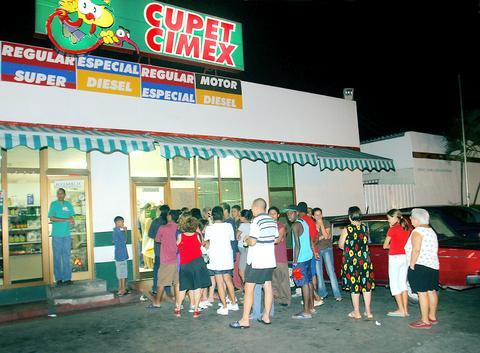Officials suddenly halted most of the dollar sales that Cubans have come to count on and warned of higher dollar prices for food and gasoline. They blamed new US measures meant to undermine the island's government.
Scores of agitated people lined up for last-minute purchases at late-night variety stores after the official declaration was read on Cuban state television shortly before 8pm Monday night.

PHOTO: AP
The measure could have dramatic effect on everyday life in Cuba, where hard-currency stores offer plentiful goods -- from soap to spark plugs -- that are available in scant quantities, if at all, at highly subsidized prices in Cuban pesos.
Except for food, gasoline and personal hygiene products, the announcement said, sales in dollars "are suspended until further no-tice." It was not clear if they would resume at some point.
It also said that dollar prices would be raised on food and gasoline -- and perhaps other products if the stores reopen. Prices in pesos, the government said, would remain stable.
Crucially, food and personal hygiene products were exempted.
Cuba blamed the measure on "the brutal and cruel" measures adopted last week by US President George W. Bush to strengthen the embargo of Cuba and to hasten the end of the country's communist government.
The announcement said the US proposals "are directly aimed at strangling our development and reducing to a minimum the resources in hard currency that are essential for the necessities of food, medical and educational services and other essentials."
Many analysts had seen the Bush measures as a relatively modest tweak to the broad US economic embargo that has been in place against Cuba since the early 1960s.
Bush said Cuban-Americans now can visit relatives on the island once every three years rather than once a year. They can spend US$50 a day rather than the earlier limit of US$164. Visits and money transfers are limited to immediate family members -- excluding uncles and cousins -- and officials and Communist Party members cannot receive funds. More money would be allotted for dissidents.
Cuban officials have warned the measures could be a possible prelude to stronger US attacks, possibly even an invasion.
A permanent closure of the dollar stores could be another step back from the liberal reforms enacted in the early 1990s to cope with the loss of aid and trade Cuba had enjoyed with the Soviet Union.
Possession of dollars was legalized in 1993 to draw dollars from growing tourism and family remittances into the state stores. The government has steadily offered more and more goods in the US currency while the Cuban ration book of items available in pesos has withered.
Many of those lined up Monday night at shops built into gas stations were buying cooking oil and soap before prices rise. Most expressed frustration at the measures.

Kehinde Sanni spends his days smoothing out dents and repainting scratched bumpers in a modest autobody shop in Lagos. He has never left Nigeria, yet he speaks glowingly of Burkina Faso military leader Ibrahim Traore. “Nigeria needs someone like Ibrahim Traore of Burkina Faso. He is doing well for his country,” Sanni said. His admiration is shaped by a steady stream of viral videos, memes and social media posts — many misleading or outright false — portraying Traore as a fearless reformer who defied Western powers and reclaimed his country’s dignity. The Burkinabe strongman swept into power following a coup in September 2022

‘FRAGMENTING’: British politics have for a long time been dominated by the Labor Party and the Tories, but polls suggest that Reform now poses a significant challenge Hard-right upstarts Reform UK snatched a parliamentary seat from British Prime Minister Keir Starmer’s Labor Party yesterday in local elections that dealt a blow to the UK’s two establishment parties. Reform, led by anti-immigrant firebrand Nigel Farage, won the by-election in Runcorn and Helsby in northwest England by just six votes, as it picked up gains in other localities, including one mayoralty. The group’s strong showing continues momentum it built up at last year’s general election and appears to confirm a trend that the UK is entering an era of multi-party politics. “For the movement, for the party it’s a very, very big

ENTERTAINMENT: Rio officials have a history of organizing massive concerts on Copacabana Beach, with Madonna’s show drawing about 1.6 million fans last year Lady Gaga on Saturday night gave a free concert in front of 2 million fans who poured onto Copacabana Beach in Rio de Janeiro for the biggest show of her career. “Tonight, we’re making history... Thank you for making history with me,” Lady Gaga told a screaming crowd. The Mother Monster, as she is known, started the show at about 10:10pm local time with her 2011 song Bloody Mary. Cries of joy rose from the tightly packed fans who sang and danced shoulder-to-shoulder on the vast stretch of sand. Concert organizers said 2.1 million people attended the show. Lady Gaga

SUPPORT: The Australian prime minister promised to back Kyiv against Russia’s invasion, saying: ‘That’s my government’s position. It was yesterday. It still is’ Left-leaning Australian Prime Minister Anthony Albanese yesterday basked in his landslide election win, promising a “disciplined, orderly” government to confront cost-of-living pain and tariff turmoil. People clapped as the 62-year-old and his fiancee, Jodie Haydon, who visited his old inner Sydney haunt, Cafe Italia, surrounded by a crowd of jostling photographers and journalists. Albanese’s Labor Party is on course to win at least 83 seats in the 150-member parliament, partial results showed. Opposition leader Peter Dutton’s conservative Liberal-National coalition had just 38 seats, and other parties 12. Another 17 seats were still in doubt. “We will be a disciplined, orderly